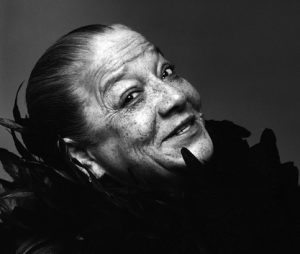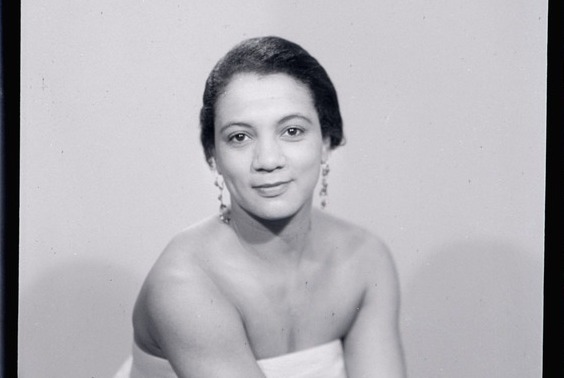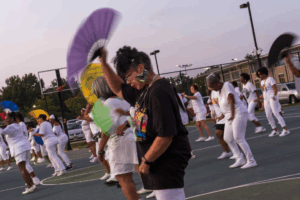We capture the history making role of a woman who loved entertainment but could only soar by becoming a French expat. The story, written for Unerased by Julia Browne—archivist, storyteller, and tour guide of Black Paris.
 Ada Beatrice Queen Victoria Louise Smith, better known as Bricktop, was a staple of the Paris social scene.
Ada Beatrice Queen Victoria Louise Smith, better known as Bricktop, was a staple of the Paris social scene.
Rewind to the “roaring 20s” in the dazzling city of lights. Black Montmartre — absent Jim Crow barriers — sat atop the lower slopes of a Paris neighborhood, beckoning rich Europeans, African princes and American movie stars. They celebrated with magnums of champagne and danced the Charleston. Freed from the dictates of segregation, white Americans and Black Americans hung out, side by side, in Black-run clubs.
By day, it resembled any other neighborhood in the city. Busy French mothers pulling along laughing children, fragrant bakeries wafting the air with daily bread, taxi stands, cafes and bustling waiters all managing the business of the day. By night, African American culture and entrepreneurship transformed the place into Harlem-on-the-Seine.
One woman, popularly known as Bricktop (August 14, 1894 – February 1, 1984) parlayed her warmth and sky-high ambition into a bridge traversing class, nationalism, and cultures. Ada Beatrice Queen Victoria Louise Virginia Smith was born in 1894 in West Virginia. She trained on the vaudeville stages on Chicago’s South Side before headlining swanky clubs in New York. Nicknamed ‘Bricktop’ for her reddish hair, at 28 she was successful, and bored.
She dreamed of owning and managing her own nightclub, impossible in Jim Crow America. So in 1924 when the call to work in Paris came, she pounced, expecting her Paris debut to start off just as glamorous.
Le Grand Duc turned out to be tiny, with an even smaller clientele. Swallowing her disappointment, she got on with it. The manager, Eugene Bullard, had distinguished himself as the first African American aviator trained within the Foreign Legion in WWI. As 1920s Paris went crazy for ‘Negro’ art, music and entertainers, this now savvy entrepreneur realized that the survival of his club demanded a bona fide African American performer. This red-haired singer with a pleasing freckled face lived up to the promise.
The patrons ballooned. Bricktop’s gracious, hospitable style turned celebrities into loyal clientele. Little did she guess that while her performance talents were limited, even by her accounts, she had a knack for sparking creativity and winning repeat audiences.
While she sang out front, in the back of the club a budding poet fresh from Harlem, Langston Hughes, was pairing her rhythms with words as he washed the dishes and soon created the literary form of jazz poetry.
By 1926, Bricktop flung the doors open to a roomier venue that now carried her name. Chez Bricktop was billed as the venue for the wealthy and the aristocratic. Surrounding her in a protective cocoon were financially supportive patrons of the arts who fought over her. In her presence some of their finest work blossomed. Cole Porter wrote the song ‘Miss Otis Regrets’ for her. T.S. Eliot composed poems in her honor.
Even as the stock market crashed in the U.S. her second bigger club did even better.
Just before the outbreak of WWII, Bricktop reluctantly returned to the U.S. The show woman never stopped entertaining, touring and performing well into her 80s.
Julia Browne – archivist, historian and expat with incurable wanderlust – is the founder of Walking the Spirit Tours celebrating Black Paris.
*******************************************************
AUTHOR SIDEBAR – Paris Noir is Part of the Black American Experience
Julia Browne confesses to insatiable wanderlust that sealed her love affair with the City of Lights. The child of Caribbean parents, she was born in England, raised in Canada and would eventually adopt France where the seeds of Black heritage took root and flowered.
Having a passion for baguettes and cheeses, Browne married a Frenchman and raised her two girls in Paris.But it wasn’t until she took a course at the Sorbonne University that her passion for Black Paris was awakened. The threads of Black Paris were weaved from the legacy of the early 1900s, the triumph of the Harlem Hellfighters during WWI and the entrancing introduction to Jazz.
Browne was fascinated by the influence of African American expats who found France more welcoming than the land of their birth. She wears three hats as archivist, historian and Paris Noir tour guide. In 1994 she launched Walking the Spirit Tours which has inspired a budding industry celebrating Black expats in the arts and entertainment dating back to the early 20th Century.
Browne authored the Paris Pathfinders collection for Unerased | Black Women Speak, bringing renewed attention to the life of expats like Langston Hughes, James Baldwin and lesser known artists Nancy Elizabeth Prophet, and Paulette Nardal.




